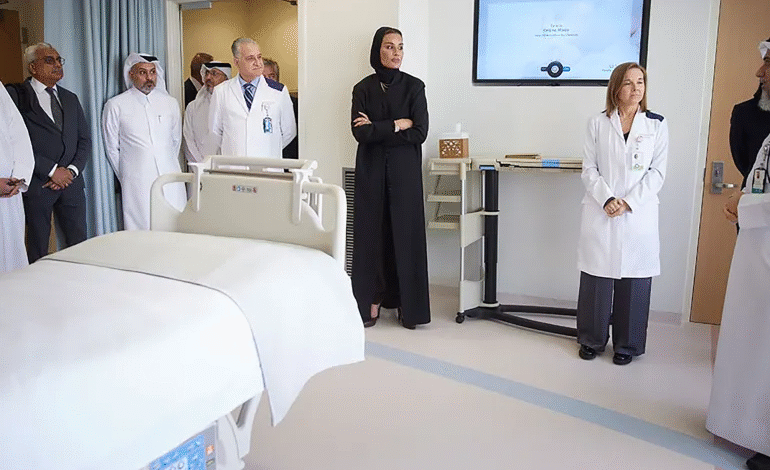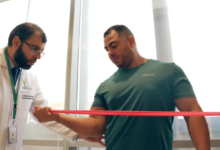Sheikha Moza Inaugurates Qatar’s First Pediatric Stem Cell Transplant Unit at Sidra Medicine

Her Highness Sheikha Moza bint Nasser, Chairperson of Qatar Foundation for Education, Science and Community Development, inaugurated Qatar’s first Pediatric Hematopoietic Stem Cell Transplant Unit at Sidra Medicine — a member of Qatar Foundation — dedicated to treating children with blood disorders, immune system deficiencies, and genetic conditions.
During her visit, Her Highness toured the new unit’s facilities and met with the clinical teams working within it. She was briefed on the pivotal role the stem cell transplant program plays in advancing healthcare by offering cutting-edge stem cell and gene therapies for children in Qatar and the wider region.
Accompanying Her Highness were the Minister of Public Health, H.E. Mansour bin Ibrahim bin Saad Al Mahmoud, members of Sidra Medicine’s Board of Governors, CEO Dr. Iyabo Tinubu-Karch, and Chief Medical Officer Prof. Ibrahim Janahi.
A Milestone in Pediatric Care
This state-of-the-art unit is a key component of Sidra Medicine’s Hematopoietic Stem Cell Transplant (HSCT) Program. It offers life-saving treatments for pediatric patients battling blood cancers and disorders such as leukemia, lymphoma, thalassemia, sickle cell disease, immunodeficiencies, and metabolic disorders.
Stem cell transplantation, also known as bone marrow transplantation, involves replacing diseased or damaged bone marrow with healthy hematopoietic stem cells, either from the patient (autologous) or from a donor (allogeneic).
Purpose-Built Facilities with International Standards
The new unit, specifically designed for children under 18, features two main sections: one for patients undergoing stem cell transplants and another for children with complex hematological and oncological conditions requiring intensive chemotherapy and inpatient care.
It currently offers 20 beds and includes high-level isolation rooms that meet international infection control standards. The unit is set to begin treating patients with autologous stem cell transplants by the end of June, with preparations underway to care for allogeneic transplant patients in a subsequent phase.
Advancing Gene and Cellular Therapy in Qatar
Dr. Iyabo Tinubu-Karch, CEO of Sidra Medicine, emphasized that the launch of this first-of-its-kind unit in Qatar represents a major step in expanding access to life-saving pediatric care. With the continued growth of the HSCT program, the unit will play a vital role in reducing the need for patients to travel abroad for treatment and help establish Qatar as a regional leader in advanced pediatric therapies such as gene and cell therapy.
She added that Sidra Medicine aims to provide high-quality, sustainable care to patients and their families — close to home.
Prof. Ibrahim Janahi, Chief Medical Officer at Sidra Medicine, highlighted that the opening of the unit aligns with Qatar National Vision 2030 and contributes to building a knowledge-based economy through developing local expertise in precision and regenerative medicine.
Research-Driven, Family-Centered Care
The HSCT program is a cornerstone of Sidra Medicine’s precision medicine strategy. It integrates clinical care with genomic research focused on autoimmune, genetic, and rare diseases in children.
Dr. Ayman Saleh, Chief of Pediatric Hematology, Oncology, and HSCT, noted that the program brings together multiple specialties to deliver advanced and personalized care for complex pediatric cases. With four autologous transplants already successfully performed and preparations ongoing for future allogeneic procedures, Sidra Medicine is laying a strong foundation for pediatric cell therapy in Qatar.
The program is supported by a highly skilled laboratory team and operates within a GMP-certified (Good Manufacturing Practice) facility under the Advanced Cell Therapy Core. This core is responsible for processing and cryopreserving hematopoietic stem cells and supports Sidra Medicine’s readiness to offer Casgevy — a gene therapy for thalassemia and sickle cell disease.
Through this pioneering initiative, Qatar reaffirms its commitment to innovation in pediatric healthcare and strengthens its position as a hub for world-class, patient-centered treatment and research.








